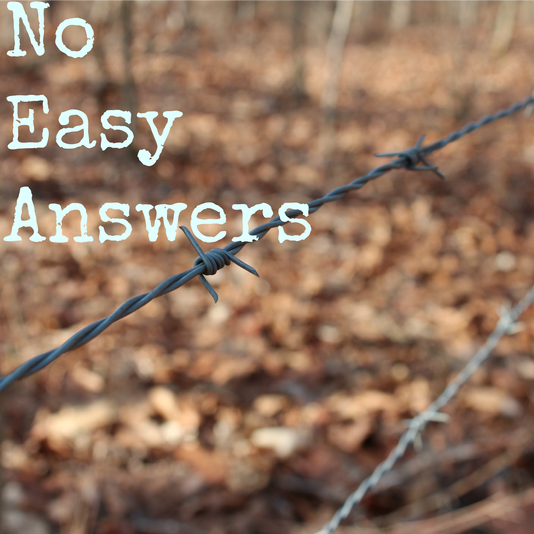Kathleen M. Basi's Blog, page 27
June 20, 2016
Two Pieces of Candy

Photo by Mr. Ducke, via Flickr
I must have been six or seven, not yet old enough to be fully aware of the vague sense of financial worry caused by growing up on a farm in the 1980s. But plenty old enough to know better.
I stole a couple pieces of candy from the open Brach’s bin at the IGA.
I knew what I was doing was wrong.
I also knew I wanted that candy, and that in my family, you didn’t ask for stuff like that. It wasn’t like there was a prohibition; I just always knew some things you didn’t ask for.
I don’t think most people understand this, so let me try to explain. Once, coming home from a trip, we were half an hour from home at suppertime. My parents had a long discussion about whether to go out to dinner or to go on home, pull a hunk of meat out of the deep freeze, thaw it out, and make something, even if it meant supper was an hour and a half late. I remember holding my breath, because we never, ever, ever went out to dinner.
Most people can’t comprehend the marvel, the excitement I felt when they decided to go out. But you see, we never went out to eat. We couldn’t afford it, so we didn’t do it. And by “never,” I don’t mean “once or twice a month.” I mean never. When we took twelve-hour road trips to see family, we packed breakfast and lunch and ate at rest stops. On a field trip in junior high, I got made fun of for ordering a happy meal–but I picked that because I knew what was in it, which wasn’t the case with anything else on the board. When I went to dinner with my boyfriend’s parents in college, I was so overwhelmed by the menu, I ended up picking the cheapest thing, even though I knew I didn’t like it, because I didn’t know how to process all those options, and I didn’t want to spend too much of someone else’s money. I just had no experience eating out.
Whether I was aware of it or not, all that background was exerting an influence on me the afternoon when I pocketed the candy from the bin on the end cap at IGA. I knew it was wrong, but I also knew how much I wanted it, and without being able to articulate it, I knew I wasn’t going to get it any other way.
Mom was still loading grocery bags into the trunk when my big sister found me out and told on me.
Mom marched me right back into the store and made me give the candy back to the cashier. I can’t remember if I had to apologize or not. I’m sure I did. And then she told me we’d wait until Daddy came home, and Daddy would decide on my punishment.
It was a horrible, horrible afternoon. I don’t think I left my room. There was fear of punishment, and there was the equal pain of my conscience. And when the big, dust-caked pickup rolled into the driveway, I remember the awful feeling in my stomach. I knew I was in for it. I mean, this was far and away the worst thing I’d ever done.
It seemed to take forever. No doubt they had a parental conference in the kitchen, while I tried to read, or write, or draw, there in my room at the northwest corner of the house.
And then came the heavy footsteps, creaking on hard wood floors. Dad came into the room and sat down on the bed next to me.
I don’t remember much about that conversation. There must have been some lesson about the Ten Commandments, but the only thing that’s clear in my memory is the moment where Dad paused and folded his arms and leaned back, and I thought, This is it. And then he said:
“Well, I think you’ve been punished enough, so we’re going to let this go now.”
I was stunned. In the moment, my relief was all about escaping punishment. But in retrospect, I realize that his choice to extend mercy was the single most effective discipline he could have imposed. Because I knew I deserved punishment, and escaping it made me so very aware of the need to be better. My dad’s mercy didn’t so much wake my conscience as set it on fire.
It’s never shut up since. It directs everything I do and say. (Well, almost everything. The occasional thoughtless comment gets out, and causes bounteous conscience exercise afterward.)
I don’t know how my dad knew I was already punishing myself. And I don’t know how to recognize it in my own children. In the moments when my kids tussle or act out, I often wrestle with discipline. They need to understand that what they’ve done is not acceptable. It’s our responsibility to form our children’s consciences, and you can’t do that without the concrete imposition of limits. But the point of discipline is to create discipleship—a desire to follow out of love, not out of fear of punishment.
And that gives me a question to ponder today, which I share also with you: In my parenting, am I looking for the moments when what is most needed is mercy rather than consequences?



June 17, 2016
On Sneaking Candy, channeling the flash, and Sucker Punches: Michael Mayhem at Four
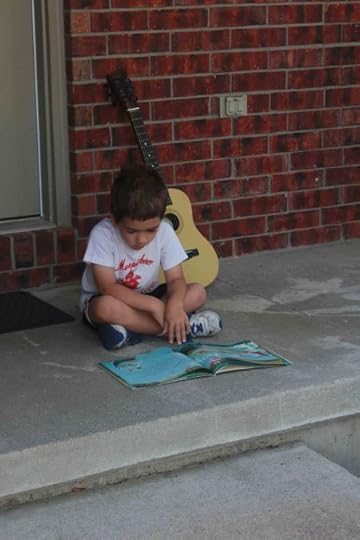
He looks innocent when he’s “reading,” doesn’t he?
There comes an inevitable day in every parent’s life when you have to recognize that you can’t treat your baby like a baby anymore.
It’s an organic process as long as you keep having more kids, because real babyhood keeps presenting itself. But although I’ve been aware of, and even partially on top of, this transition with Michael, it’s just since school let out that I’ve realized how far past time it is.
He’s not the sweet, faultless child in every altercation anymore. In fact, as Wednesday’s post should have made clear, he’s got a pretty strong deceptive/willful/selfish side going.
He’s incredibly smart, starting to write letters although we do no such work in our family on things like that, and connecting starting sounds with letters (“S begins with STOP!” is the usual formula). He wants to do homework and have his work hung on the hutch and the deck door with everyone else’s.
He wants to be grown up. He insists upon using the “big boy” silverware (i.e. dinner fork and soup spoon), even though all his older siblings want the small ones, and he’s constantly asking me, “When will I be big enough to sit without a booster seat/play an instrument/drive a car/ride a motorcycle?”
He’s constantly taking things apart, just because he can. The words “Leave it alone! Don’t mess with things just to mess with them!” don’t seem to have any meaning.
He’s throwing and catching balls and running better than any of his siblings did at his age, or two years older than his age, for that matter.
And speaking of running. Oh, the running! He’s really into the Flash right now, and he braces and then launches himself across whatever space he has. Which is not nearly enough, I might add; stopping is almost universally a problem. Let me put it this way. When it comes time to slide into home plate, he’ll have already had lots of practice. In the meantime, he’s mostly bouncing off the walls. Literally.
And oh, that child is causing trouble in sibling land. Other people must share with him, but “that toy is MINE! You can’t play with it!” Obviously, he ate Nicholas’ special candy. I tell him to put away a toy, and not to throw it on the floor, but actually put it on the shelf. Then I go downstairs to find it on the floor anyway. That kind of stuff.
Oh yes, I forgot. The Facebook world heard this gem, but the bloggers have not. And it’s a good one.
He’s been punching lately. It’s not malicious; he’s just playing superhero-bad guy, and the bigger kids, by and large, didn’t realize what kind of monster they were creating until it was too late. Well, Nicholas knew it. But Nicholas wasn’t encouraging him the way everyone else was, either.
Michael loves to get a laugh from people, and the punching thing makes big kids laugh. Until one night at a baseball game he was punching complete stranger kids, and they realized it hurt! I had to make him sit on my lap for the last twenty minutes of the game, because he wouldn’t stop, no matter what I or anyone else said. It was deeply unpleasant for both of us. He is a wiggly, wiggly kid.
But the kicker was last week at the grocery store, when Alex and I were perusing the yogurt options, and Michael caught him completely unawares with a Flash-run and a full-power sucker punch to the sternum. Alex went down in a heap on the floor, trying to control his poor tween hormones and pride while in deep pain. I could see him trying not to wail, scream, or retaliate.
It was hard to decide whether to laugh or be furious. Either way I couldn’t punish, because we were in public. Actually, that turned out to be a positive, because by the time we got to the car I’d had a burst of inSpiration. Michael had to do one of Alex’s weekly cleaning jobs as a consequence for punching his brother. Which, I have to admit, he did with very good grace.
It’s hard not to keep a tender spot for your youngest child, but he has the potential within him to be a holy terror if I don’t rein him in. And it just about has to be me, because he’s got the mama’s boy thing honed to an art form, much more so than the other two boys. Yesterday, he would not hold his daddy’s hand. “I want to hold mommy’s hand!” he said.
“Why not? Do you like me?” Christian asked, grinning at me.
“No!”
“Do you like Mommy?”
“Yeah!”
Four and a half. And still earning the nickname Mayhem.


June 15, 2016
Boys Have Drama, Too
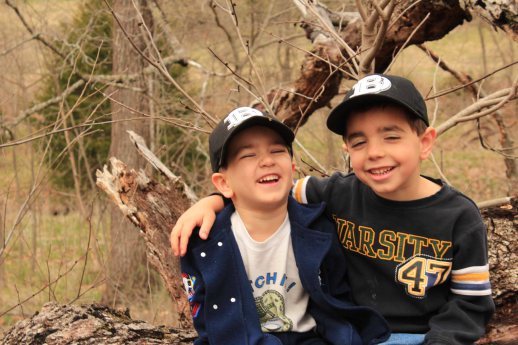
Taken a year ago
Let no one, me especially, claim that boys come without the drama attached to raising girls.
Every child loves his first grade teacher. It’s an unspoken rule, right? You must be hopelessly, gaga-eyed in love with your first grade teacher.
So when your first grade teacher gives you a bag full of gummy worms on the last day of school, labeled “book worms,” to keep you company while you read over the summer? The worth of such a gift cannot be quantified.
And when, after two late nights in a row (because you were “mascot-ing” for your big brother’s baseball game), you discover that your twerpy four-year-old brother ate them on the sly?
Oh, the drama.
Heartbroken sobs, carrying over the noise of the shower. Piercing the thin walls and sinking like your spirit down the stairs of your broken world, so that your parents are forced to share in your grief.
Seeing your twerpy little brother punished isn’t enough. You must vent your drama by shoving him to the floor, even if that means now you’re in trouble, too. So you go to bed wailing, heartbroken sobs.
I was having trouble sympathizing, but I decided not to push the issue of making him settle down. Let him air his drama. Maybe it’ll arouse some empathy in his younger roommate. Or at least, the annoyance of having to listen to it will be a punishment natural consequence of his actions.
Then, of course, there’s the girl drama.
Said child periodically (usually when overtired) goes to sleep crying over lost (girl) playmates who have moved away or been separated from him by other circumstances.
Let us back up an hour from the loss of gummy worms and drop in on the same child, playing at the kids’ area of the mall. Take note of the light blazing in his eyes when his bestest-estest-estest friend EVER unexpectedly appears beside him. (It’s a girl.) (She’s a year older than him.) Imagine the crushing two-way bear hug.
Drama, indeed. After a half hour’s wild abandon of playing, we finally take our leave. He says to me, “The moment I met her eyes, I just KNEW, because I LO—” A sharp cutoff and reconsideration. “I love my friend! I love her soooooooo much!”
He might not be too happy to know that he has something in common with his twerpy Gummy Worm Thief brother. When I picked up my youngest child from his summer enrichment preschool yesterday, his teacher greeted me with, “Your son, I’m sorry to tell you, has a girlfriend. And it’s very much mutual.” Today? A head shake. “I believe they were holding hands today.”
Ah, well. What would we do if life was drama free?
(Update: twenty minutes later, Michael is yelling at Nicholas to shut up. Natural consequences, indeed…)


June 13, 2016
Easy/Hard

Image by ELTMAN, via Flickr
Why is it so easy to see or hear one detail and leap to the worst possible conclusion about a person’s motivations?
Why is it so easy to give our past hurts permission to control our present reactions, and block out reason when it urges moderation?
Why is it so easy to skip over grief for lives cut short and families in pain, and spend all our energy pointing fingers and hurling accusations?
Why is it so hard to listen to reason when it’s trying to keep us from demonizing others?
Why is it so hard to empathize with people who are different from us?
Why is it so easy to paint them as inherently evil in our minds and hearts?
Why is it so hard for people of faith to recognize when we are doing exactly what we accuse others of doing?
Yes, I am reacting to Orlando. And I’m sending out these questions in every direction—toward shooters and those who are arguing about gun control vs. gun rights and those who are anti-gay and those who are steadfastly, even stubbornly, refusing believe that a Texas politician’s tweet wasn’t a response to this tragedy at all, despite the fact that we’ve all experienced the agony of having said the wrong thing in the wrong moment and not even known it until it was way too late to take it back.
Which is not to say I support the man. I have a feeling he and I don’t see eye to eye on a whole bunch of issues. And I do think tweets like that are kind of self-righteous, and probably do more to drive people away from Christ than invite them in.
But I don’t believe he posted it as a “nanny nanny boo boo” in the face of the LGBTQ community, either. Speaking rationally, it doesn’t even make sense to read it that way. It’s saying you sow what you reap…so the only way it could be a jab at LGBTQ community is if he’s suggesting that the LGBTQ community has been going around shooting people. ???? I’m just not seeing the connection. Although as always, I’m open to being corrected.
All day yesterday, I watched Facebook explode with anger and bitterness and nastiness. It went every possible direction. Terrorists, Republicans, Democrats, Trump, Obama, liberals, conservatives, gun-control advocates, gun-rights advocates, gays…everybody got bashed. It made me want to cry. You have this calling to blog, and you know your reach is small, but you keep hitting the same message over and over: listen to reason, listen to each other, think about how you talk to and about people, think about human dignity…and a situation like this comes up, and emotions erupt, and you think, “Is there any point in me writing at all, if it’s going to make no difference at all when it’s really needed?”
Why is it so easy to think the worst of people who are different than us?
Why is it so hard to see them with the eyes of Christ, who loved and accepted and challenged all at once?
Why is it so easy to give ourselves permission to become a mirror image of what we most despise?


June 10, 2016
Strawberry Season

The exact boxes we picked into when I worked at the orchard. Photo by ewan traveler, via Flickr.
We picked strawberries twice this spring, at the orchard where I had my first non-babysitting job. The first time, my mom met us there and Michael decided to help her fill her flat. Here’s his story, which he shared with me on the way home: “I picked a strawberry, but it had a bad spot. Grandma said we don’t want strawberries with bad spots. I tried to put it back on the plant, but it wouldn’t go.”
Alex and I got a good giggle out of that bit of cuteness.
I both loved and loathed that job picking strawberries. The orchard was at the edge of town, across from the water treatment plant and along the railroad, which separated it from the east-west highway. We lived a handful of miles farther out in the country. During strawberry season, my sister and I rode our bikes there in the cool of the morning and picked berries until 11 or 11:30, and then had to ride home again, which was the really icky part. We picked with various other junior high and high school students over the years we were there, most notably a girl who later suffered from cancer and beat it. I have no idea where she is now.
But that place was quite the education in a time quickly passing, although I didn’t realize it then. Edgar, the owner, was, well, he looked a lot like the old man in “Up,” but he was taller. But his voice was much higher-pitched, a little nasal, and his mannerisms were much like those of my sassy, feisty, also-country-bred grandmother. His wife was really sweet, and he employed an enormous lady who had a cackly voice and who LOVED to talk. She’d sit there picking through our quarts of strawberries to separate the biggies from the littles, which were sold separately, and I swear she ate one for every three she put in a box for sale.
Edgar himself could not have been a better boss. We got paid 25 cents per quart we picked, 6 quarts to a flat, so $1.50 a flat. But when we were picking in the older vines, which made smaller berries, he’d pay us more because it took longer to fill a quart box. He rounded everything up and paid us in cash. He gave us sodas and ice cream bars, and about half the time he took pity on us, loaded our bikes in the back of his truck, and drove us home. I do not understand how the man made a dime.
I worked at that orchard maybe three weeks a year for, I don’t know, four or five years. I didn’t realize what that experience had done to me until Christian took me strawberry picking early in our marriage and he got mad at me because he thought I was picking more than we could use. (Which was almost certainly true.) But in the last two years, as we have started taking the kids strawberry picking, my extreme efficiency and speed has become a family joke. It’s like I can’t stop until every berry is gone. And I really like picking them. There’s a pleasure in popping those fragrant, fat, soft berries, so different from what you get at the grocery store, off the vine and into the flat. It’s a little addictive.
And it turns out Alex finds it that way, too. Day one was twenty-four hours before we left for Memorial Day weekend, and we came home with twenty-three pounds of berries. I spent the entire afternoon washing, stemming, slicing and freezing jam and pre-measured fruit for pies. Ahem. The second time, we picked seven pounds in twenty minutes. It seemed woefully insufficient. I told the current owner maybe next year we’d come work for him again. And Alex actually liked the idea.
It’s been a crazy week, and since Michael is attacking bicycles and the Hyundai windmills with a pool noodle light saber, I think it might be wise to sign off. Happy Friday.


June 8, 2016
The Awesome And Terrible Responsibility of Raising Boys
 At present, the web is a hornet’s nest of outrage over the light sentence given to the swimmer convicted of rape—and his father’s response—and his victim’s lengthy, no-punches-pulled response to her attacker.
At present, the web is a hornet’s nest of outrage over the light sentence given to the swimmer convicted of rape—and his father’s response—and his victim’s lengthy, no-punches-pulled response to her attacker.
And all of this makes me think about myself as a parent, and what this means about my particular responsibility as a parent of boys.
I have for a long time been convinced that the terrible ugliness that is sexual assault is a multifaceted problem. Saying that always lands me in hot water—usually by being accused of “blaming the victim.” So let me be clear: rape is no one’s FAULT except the perpetrator’s. No one is “asking for” rape, no matter what they wear or say or do.
Yet it’s a dangerous oversimplification to pretend that outside factors don’t come into play. Men are visually stimulated; it’s a biological reality. Alcohol removes inhibitions, and people under its influence say and do things they know are wrong and would never do if they were in their right minds.
Does any of this excuse rape? No. Men who rape are responsible for their actions, no matter how much alcohol they’ve consumed, no matter how much alcohol their victim has consumed, and definitely no matter what a woman is wearing.
But if we want a solution to this problem–which has been a plague of humanity as long as humanity has been around–we have to address every facet that exerts an influence. I have a lot of opinions as a woman about women’s responsibility, but what I really want to focus on today is the men.
See, another thing we’re not supposed to do is talk about sex when we’re discussing rape. Rape isn’t about sex, we’re told, it’s about power. But sex is the tool being used by men who rape, so you can’t pretend it’s irrelevant. And here’s the thing:
We have a cultural problem with sex. Men are taught–conditioned, even—to view women as objects to fill their desires. (See how that ties into “power”?) They are encouraged to measure their self worth by the size of their genitalia. The culture of boyhood teaches them to appeal to the basest, grossest part of their nature. In childhood, it’s fart humor and poop jokes. In college, it’s the bragging rights, the “let’s sit around in the lounge and turn every discussion to a joke about sex.” (In grad school a group of us one day were having a conversation about conductors, and I was talking about working under so-and-so, and this guy goes, “See that’s your problem. You’re always UNDER instead of on top!” Har har. You’re so witty. Excuse me for a moment while I add you to the list of “people not worth talking to ever again.”)
It’s not that girls never do this, but it’s not part of the girl culture the way it is for boys. Boys are conditioned to view their own gratification as paramount, and to belittle something that, truly, is the most intimate act in the human experience. I mean, as women, we are literally inviting someone else to take up residence inside our bodies. This is no trivial thing!
And this is the world my sons are inheriting. The world I’m supposed to be preparing them for, the world they will have to navigate. I already see them having to choose whether to buy into the boy culture or to stand aside from it, as their father has chosen to do.
 I love being a mother of boys. I love how they just lay it all out there. I love the adventuresome spirit and the pursuit of thegrandiose and heroic.
I love being a mother of boys. I love how they just lay it all out there. I love the adventuresome spirit and the pursuit of thegrandiose and heroic.
I also love that they have, in their father and myself, a model of a relationship based on deep respect and a willingness to call each other out when one person is in the wrong. Whatever other flaws we possess as human beings, I am secure in knowing we are showing our kids what it looks like to treat the opposite sex with dignity. I know they are seeing a relationship in which the good of the other is paramount, and that it’s a two-way street. In which we set aside “me” (I’m tired, I had a hard day, I’m in a bad mood, I want to watch TV) for the good of the other. I love that we are raising boys who are watching the news and who are processing the world and trying to figure out how the puzzle pieces fit together.
It is an awesome and terrible responsibility, being a parent of boys. There’s no doubt in my mind that this ugly reality surrounding assault and the lack of dignity given to women can only be addressed if we get over our hangups about talking about sex. It can only change if we teach our children—all our children, but especially our sons, because let’s face it, for the moment, men still have more power to shape the world—how to treat everyone around them with dignity. It’s a hard lesson to teach, because it’s a hard one to model. It involves approaching choices with thought, rather than impulse, and considering how every choice impacts the people around you. It’s about moderation and self-control—two values that are really not a part of the consumer economy we live in.
This post has taken me pretty much forever to write, and as long as it is, I’ve abandoned almost as many words as I’ve included. So I’m going to hit pause for today and just conclude by saying that this awesome and terrible responsibility is why I am so grateful for the Theology of the Body—because in all the static out there about abstinence-based versus so-called “safe” sex education, this is the one philosophy that is really acknowledging the whole picture of humanity: What happens to the body also impacts the soul, and what injures the soul also affects the body. If we can use that reality to shape the next generation, it will make a difference
for the better.


June 6, 2016
She Makes It Look Easy
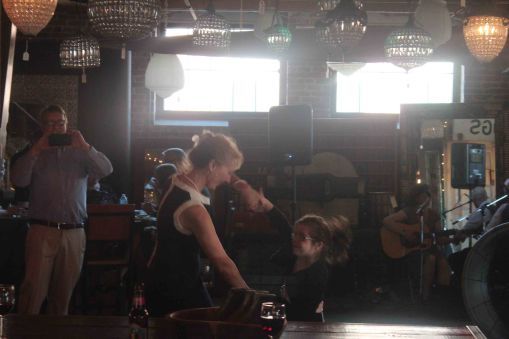 By the time we arrived at the wedding reception, the room was overflowing with people we didn’t know. Ordinarily Christian and I are both highly functional introverts, able to fake it so long as we’re together and/or we know our role in a given situation. We often bicker at home about who has to call the plumber/pastor/bus company/playdate-parent. Or approach sales associates for help in the store. And because he has to put himself forward so much at work, it’s usually me who has to take point at other times.
By the time we arrived at the wedding reception, the room was overflowing with people we didn’t know. Ordinarily Christian and I are both highly functional introverts, able to fake it so long as we’re together and/or we know our role in a given situation. We often bicker at home about who has to call the plumber/pastor/bus company/playdate-parent. Or approach sales associates for help in the store. And because he has to put himself forward so much at work, it’s usually me who has to take point at other times.
But on this night, we both felt uncomfortable. We really didn’t know anyone except the bride and the groom, and they, of course, had many, many people to talk to, not just us.
We surveyed the room, and we realized: There was no place left for a family of six to sit together.
Then, with relief, we realized there was a back room, and mercifully, it was almost empty. We settled in at a gorgeous lacquered wood table that could seat ten or twelve. Slowly, the room filled up around us. Nicholas found a couch and a couple of boys his age. Michael went, as he is wont to do, with his big brother. We struck up a conversation with another family who sat down beside us. And poor Alex sat at the table with his parents, looking every inch the miserable introvert.
But Julianna? By the time the guitar-violin duo started playing on the other side of the room, an hour later, Julianna had already made friends with a couple babies and started building her usual fan-club-on-the-go. At the sound of music, she grabbed the first hand she could find and gave them no choice but to dance with her. And so it went for the next twenty minutes. I mean…two hours.
My daughter is an extrovert in a family full of introverts.
I leaned over to Alex. “Do you ever envy her?” I said. “How easy it is for her to interact with people?”
His lips twisted in that trying-not-to-smile smile. “Sometimes.”
What does this have to do with mercy?
The thing is, so much of what gets in the way of my attempts to live out mercy is this deep-seated discomfort with reaching out. I’m so bad with names and faces, it’s reached the level of a full-on psychological hangup. I seriously have to interact with people five times before I put it together permanently. And Christian and I have lived so much of our lives smack dab in the eye of our community. Even our engagement was public. I’m forever running into people who light up and wave at me, and I have no earthly idea who they are. It’s not a big deal if they just smile and greet me and move on, but when they start asking questions about my family, I’m in agony, because it seems clear I’m supposed to know who they are, and I ought to be asking questions in kind, and I don’t know what to ask!
To put it simply: if mercy is about heart to heart connection with everyone you come into contact with, I suck at it.
That whole evening, I watched Julianna fling herself into the void with reckless, joyous abandon. She doesn’t worry about conventions or scruples. She doesn’t worry about the fact that she doesn’t know somebody’s name—she just goes, “Oh! Hi! What’s your name?” (When I am ninety, I will still hear the characteristic, charismatic way she inflects those words, and I believe it will still break my heart with joy just as it does now.)
Mercy is her homeland. Last night, when Nicholas had a drama moment involving a guest, the guest got sent to sit down for a few minutes. Of course, all the boys went along to keep him company. (Solidarity, man. Solidarity.)
Then, of course, we grownups got wrapped up in our conversation and forgot to release him. It was Julianna who came over to us and tugged at our proverbial arms and reminded us that the boys had all been in time out long enough, thank you very much. It was hysterically funny, and such a moment to see that mercy is who she is.
And it has nothing to do with great deeds, political statements or what you do or don’t give to the poor. It has to do with loving people, wholeheartedly, for whatever fraction of a moment she’s sharing a space with them. It’s about deep empathy with everyone she meets, and not one inhibition about doing something about it.

Case in point: Alex was feeling crabby and uncomfortable at the races, and Julianna just wanted him to feel better…and before long, she’d cajoled him from this…

…to this.
This is a gift children have that adults do not, because they lack the sophisticated worldly understanding that impedes us. But it is also a gift of her extra chromosome: Her disability places her outside the mainstream. It releases her from the straitjacket of convention and expectation under which the rest of us labor to live our lives.
And that gift is one that stretches my mind and my heart as well. It allows me to recognize how simple mercy really can be, how uncomplicated by practicalities. Even if it is never a brand of mercy that I am capable of emulating myself, it nonetheless helps me understand better what the heart of God looks like, and why mercy is the expression of agape in this broken world.
(For other Mercy on a Monday posts, click here.)


June 3, 2016
Roller Coasters

Image via Pixabay
First comes the idea. That electrifying, spark-you-wide-awake-no-matter-how-tired-you-are nugget of a concept that tells you you’ve hit the jackpot.
It seems so crystal-clear, so obvious, like you could start writing this very moment. But then you realize you don’t have the foggiest idea what the details surrounding that concept are. So you start brainstorming. And you make it all far too complicated. And then, after weeks of thinking and pondering and thinking and pondering, you figure out it’s far too complicated. You pull back, and things begin to crystallize. Characters begin to form. You see where they came from, how they all know each other, the things that tie them together. You do a bunch of online research. You ponder motivations. You say a lot of “Please God help me figure out…” prayers.
But at some point, all that becomes a clever little ruse inside your head, because the truth is, now you’re getting close, and you’re starting to panic.
Because now it’s time to Get Started. And Getting Started is, hands down, the worst part. Because no matter how much time you spend figuring out what makes this character tick, you don’t really know her voice. And that voice is really critical, because it makes people fall instantly into lock-step in her corner…or it makes her sound whiny and bitchy and wishy-washy.
So you grit your teeth and you start putting words “on paper,” knowing very well that the first opening you write is guaranteed to be crap anyway. You just write, and you refuse to look back, because now that you’re inching out onto the tight-rope wire, you know the sensation of vertigo will plunge you into the abyss if you give it the slightest encouragement. So you write. And you write more. And you write more.
And then one day, a miracle happens. You emerge from thirty or forty or fifty pages and you realize, now, at last, you know this character. You no longer feel like you’re on a tight-rope wire, but a well-supported suspension bridge. A few more chapters, and suddenly you’re terrified again, but for a wholly different reason: because now you know these characters have something really important to say, and you’re afraid you’re not good enough to give them their voice. Instead of praying, “Please help me figure out…” you start praying, “Please help me live up to these characters.”
And then you reach the end, and you go back to the first scene. And you wrestle and wail and moan and lie awake at night, but now instead of wrestling an unknown monster, you’re wrestling your best friend. You sharpen character motivations. You change character motivations. You discover things they knew all along, but which you had missed. And slowly, oh so slowly, with the help of objective eyes and a lot more anguish, something beautiful emerges. You shift your focus; you start obsessing over pitches and Twitter pitches and loglines and queries and synopses. You send out your baby…
And then it’s time to start from scratch again.
I wrote the first scene of a new novel this week. And it was so paralyzingly scary that I felt the need for some blog therapy about it. Just to remind myself that I have, indeed, done this before, and that although it feels overwhelming, it felt that way the last time, too. To remind myself that nothing worthwhile just spills out of a person in the inSpiration of a blissful creative moment. The Spirit works, but then I have to work, too.
Nose to the grindstone.


June 1, 2016
I Give My Kids Experiences
It turns out that physical things don’t buy as much happiness as experiences. It’s experiencing things together that binds us. This makes sense to me. My kids want an Xbox. We’ll let them earn money to buy it themselves, but we’re not buying it ourselves. We don’t have room in our living room for any more crap, and anyway there’s too much useless screen time in our house as it is.
Besides, it may pacify them in the moment they’re actually using it, but if psychology is right, and I think it is, a few years from now they’ll get much more emotional satisfaction out of remembering the cool things we did together.
Like staying at a cool historic hotel (this one, review to come later on Pit Stops For Kids), high on character…


…with a bowling alley in the basement!

Or like walking 1.5 miles each way to visit a 2300-foot-long rail-to-trail bridge.


Or getting this close to a wind turbine…

…on the way to the wedding of Mom and Dad’s friends:

…who managed to do the impossible and have AMAZING food (Ecuadorian!) for a whole lot of people at quite possibly the coolest reception venue ever:



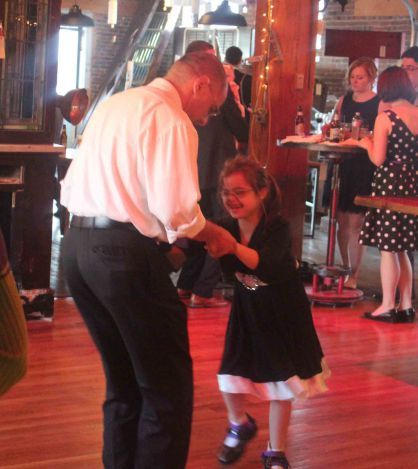
Oh yes, and don’t forget the thoroughbred horse racing we squeezed in between Mass and wedding on Sunday.


It was a pretty intense weekend. We filled just about every moment, because whenever we tried to settle down at the hotel, the littler boys turned on the “stir crazy” gene.
We have two more travel writing trips this summer. In the preparation stages I almost always go through an introvert’s panic attack feeling of being overwhelmed by the desire to stay home and keep things simple hesitation. But I always take a deep breath and push through, knowing that the experience is worth the effort.


May 27, 2016
Why, Hello, Summer.

Photo by ji young Yoon, via Flickr
It seems that lately, most of the people I talk to about summer plans say, “We have no plans. We go to the pool every day!” Speaking for myself, I might not mind going to the pool every day under two conditions: 1) the water is warm; 2) there’s plenty of shade. But since those two conditions don’t really exist where I live (especially in conjunction with each other!), the pool feels more like a chore to me than a pleasure. I really, really, really, really hate sunscreen. (Really.) And squinting. And when you have four kids who are only so-so swimmers, taking kids to the pool involves being at maximum mental capacity from the time you enter the enclosure until the time you leave it. This will be the first year I feel like I can take them by myself at all.
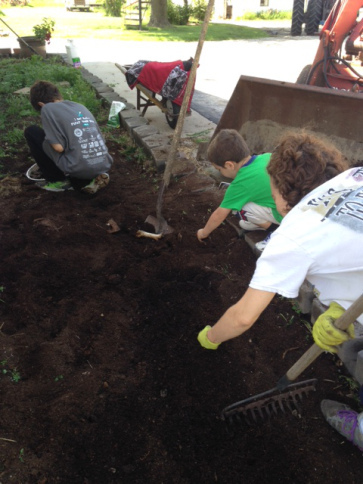
Summer break, day one: helping Grandma rid her flower bed of rocks.
I’ve spent a lot of time pondering how to spend these summer months wisely. Field trips are good. I do like the fact that the kids get to sleep in, because it means I have more than 45 minutes of work time at 5:30 a.m., which is hands down my best brain time of the day. I like having evenings open, where we aren’t in a high-stress, get-out-the-door mode.
But unstructured doesn’t seem to work for us. My kids fight a lot. And they get bored easily. And while I could stupefy them with screen time, they always fight more afterward. And it’s really hard to concentrate on, say, novel plotting, while Julianna is reading Sophia, the Little Mermaid, or Anna and Elsa in her compressed, monotone (read that: loud) voice and Alex is practicing piano and the other two are fighting over Lego, or light sabers, or who gets to go first at Gobblet. It’s hard even to concentrate enough to write this blog post.
Since it’s so hard, I tend to problem solve it a lot. And the result is that last summer, I was so focused on creating productive time, I felt like I kind of cheated my kids.
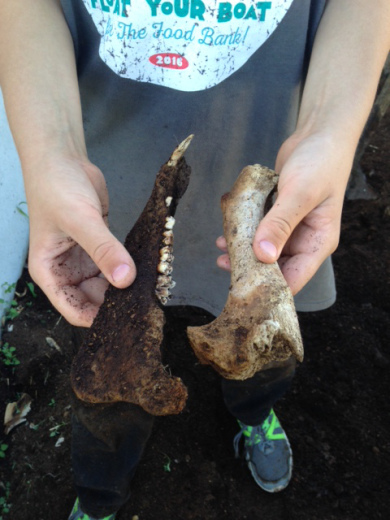
But we’re leaving behind the jawbones and other skeletal remains of the hogs that were composted in this sawdust. I’m quite sure every child in my kids’ schools envisions spending Day One of summer break doing just such archaeological excavations.
So this year, I’m committed to doing a better job of splitting the difference. To that end, I’m setting some general guidelines along the lines of New Years Resolutions. Because I know I will make time to write, I’m not even talking about that.
1. Pool twice a week.
2. Practice my flute half an hour a day, five days a week. Well, four at a minimum. (How far I’ve fallen from the years when I walked through a blizzard to practice four hours every single day!)
3. “Homework” time—a single worksheet or flash cards for the three younger ones, at least twice a week once summer school lets out. That may seem cruel and unusual, but the teachers have asked for it.
4. Field trips. I did the prep work, so we already are committed to two multi-day trips and one day excursion for Pit Stops For Kids. And if last summer taught me anything, it is that the distance between the end of summer school and the start of the fall semester isn’t as great as it seems, so I’m only listing three more “must-do” field trips, two of which are local.
5. I’ve promised Alex I will make time from my Womens Fiction Writers Association challenge to read a series of books that he loves, called the Unwanteds. I’m on book two.
What about you? Do you make plans for the summer? Or does unstructured really work for your families?



